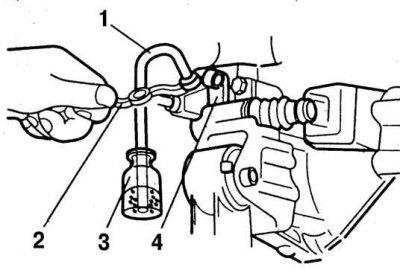Attention! Be careful not to spill clutch fluid on painted surfaces. If this happens, immediately wash off the liquid with water.
Note. Do not mix different brands of clutch fluids.
Note. Do not reuse drained clutch fluid.

Pic. 3.2. Bleeding the hydraulic clutch release: 1 - transparent tube; 2 - ring key; 3 - glass vessel with brake fluid; 4 - working cylinder
Any hydraulic system works normally if air is removed from it.
When bleeding, add only clean fluid recommended by the manufacturer. Never reuse fluid leaked from the hydraulic clutch release.
If fluids of different brands are accidentally mixed in the hydraulic system, remove the fluid from it, flush it with clean fluid of the required brand and install new o-rings.
In case of constant leakage of fluid from the hydraulic drive or air entering it, determine the cause and location of the leak, and repair the damage.
Before bleeding, remove the clutch reservoir cap.
Suck out the liquid from the tank with a suction pump.
Remove the cover of the union to remove air from the clutch slave cylinder and put a vinyl hose on the union.
Place the other end of the vinyl hose into a container.
Move the clutch pedal slowly several times.
With the clutch pedal depressed, unscrew the fitting using a special tool to release the fluid.
Tighten the bleed screw to stop fluid from escaping.
Again, repeat the pumping procedure several times until only clear liquid comes out of the tube.
Tighten the bleed screw.
Tightening torque: 5.9 - 8.8 Nm.
Add fluid to the reservoir up to the MAX mark.
Install the cover.
Check the correct operation of the clutch.
